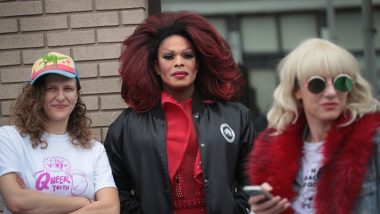Sydney, June 13: Australia set out guidelines Thursday to make sport more inclusive for transgender and gender-diverse people as it works to change attitudes and limit discrimination. The move, which follows widespread consultations, details how sports organisations can create more welcoming environments. Australia's move comes as debate rages globally about whether transgender athletes or those with differences of sex development have an unfair competitive advantage.
The guidelines cover everything from victimisation, leadership and codes of conduct, to suitable facilities, privacy and the collection of personal information. They are designed for boards, coaches, umpires and other officials and staff, while suggesting organisations encourage high-profile players to champion the initiative. Uttar Pradesh Shocker: Meerut Cops Lathicharge Transgenders 'Mercilessly' Inside Police Station Premise Over Allegations of Asking Gifts.
"Research tells us gender-diverse people, particularly young people, want to engage more in sport and physical activity but often face or fear peer rejection," said Sport Australia chief Kate Palmer. "Let's ensure sport is a welcoming place that helps. Let sport be an example for broader society, showing how we can positively influence community connections and a better future." The guidelines were developed by Sport Australia in consultation with the Australian Human Rights Commission (HRC) and the Coalition of Major Professional and Participation Sports, whose members include Tennis Australia, Rugby Australia and Cricket Australia.
While it is unclear how widespread discrimination is, the report gave examples of a trans man being told he could not register to play for a men's club and "non-binary" people prevented from accessing women's change rooms, where they feel more comfortable.
The issue of transgender athletes is complex. Tennis great Martina Navratilova and retired British athletes Paula Radcliffe and Sharron Davies are among those who have questioned the inclusion of transgender competitors in women's sport.
Separately, South African runner Caster Semenya has launched a court challenge against the International Association of Athletics Federations (IAAF) rules forcing female athletes to regulate their testosterone levels.
LGBTI sport charity Proud 2 Play's outreach manager Bowie Stover hailed the Australia's move as a positive step. "As a non-binary athlete and having worked with numerous sporting clubs and codes over the past few years, I've experienced first-hand the many positive outcomes that occur when clubs actively show support for their trans and gender-diverse participants," Stover said.













 Quickly
Quickly


